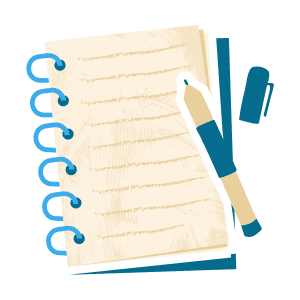Stress in the workplace, unfortunately, is commonplace across Canada and the United States. According to Wrike, some 94% of workers report feeling stress in the workplace. Not only that, but a third say that their stress level ranges from high to unsustainably high.
Regardless of how much we love our jobs, stress is generally just part of the package. Stress levels vary between different industries, putting some workers at a higher risk than others.
What is Stress in the Workplace?
Stress in the workplace manifests in the same way our usual stress does. It is the harmful, physical, and emotional response that employees experience when there is a conflict between the demands of the job, and the amount of control an employee has over meeting those demands. While these conflicts are the main cause of stress in the workplace, there are many common causes;

- Low salaries
- Excessive workloads
- Lack of opportunities for growth or advancement
- Low engagement
- Lack of social support
- Lack of control over job-related decisions
- Conflicting demands, or unclear expectations
Smaller, daily events also contribute to stress in the workplace. While this stress may seem irrelevant, the constant and cumulative impact will ultimately affect your performance at work.
The Impact of Stress in the Workplace
Stress in the workplace can cause problems for both the employee and the organization. When it comes to employees, it can have physical, emotional, cognitive, and behavioural effects.
PHYSICAL EFFECTS OF STRESS IN THE WORKPLACE

Similar to general stress, one of the most common physical effects for employees is sleep disturbance. According to Harvard Business Review, 66% of employees have suffered from sleep deprivation caused by stress. As you can imagine, this will further contribute to the effects on the organization, which we will cover below. Other physical effects include headaches, gastrointestinal issues, and raised blood pressure.
EMOTIONAL EFFECTS OF STRESS IN THE WORKPLACE
Most employees who experience continuous stress at work also experience feelings of anxiety and irritability. Similar to sleep disturbances, these issues can be carried into the workplace, creating more problems. The longer these feelings continue, the more likely they are to develop into depression or other mental health struggles.
COGNITIVE EFFECTS OF STRESS IN THE WORKPLACE
Stress can affect cause employees to suffer cognitive issues such as loss of concentration and motivation. Even worse than that, long-term stress in the workplace can contribute to difficulty with the thought process, loss of memory, and poor decision-making. You guessed it, all of these will also affect the organization.
BEHAVIORAL EFFECTS OF STRESS IN THE WORKPLACE
While these effects are slightly less common, and generally only result from prolonged, continuous stress, they are very real. Common behavioural issues that result from stress in the workplace include substance misuse, inappropriate displays of behaviour, isolation, and poor punctuality. Naturally, these are not ideal behaviours for an employee to be exhibiting.
EFFECTS OF STRESS IN THE WORKPLACE ON THE ORGANIZATION
Finally, it’s important to address how all of these effects can impact the organization. Whether it’s one employee or the entire workforce, stress in the workplace can create huge problems. These problems generally include;

- Increased absenteeism
- High employee turnover
- Poor timekeeping
- Reduced performance and productivity
- Low morale
- Reduced employee engagement
As an employer, it is in your best interest to ensure that stress in the workplace is well managed and kept to a minimum. Otherwise, you might see the above issues cropping up regularly. We break down how you can combat workplace stress in a previous blog post. Below, we look at the steps that employees can take to prevent and reduce it themselves.
How to prevent stress in the workplace as an employee
TRACK YOUR STRESSORS
One of the first steps to preventing or reducing stress in the workplace as an employee is identifying and tracking your stressors. Each individual employee will have unique triggers that contribute to their stress. Being able to identify and track these stressors allows you to identify patterns and situations that cause them.

Keep a journal where you note your thoughts, feelings, and information about the environment, including the people and circumstances involved, the physical setting, and how you reacted. This will help you to recognize stress-inducing behaviour before it occurs, and allow you to adjust your reactions to be healthier.
REQUEST CLARIFICATION
How often do you receive unclear instructions from your senior? How clear are you on the expectations of you from management? 31% of surveyed US workers said that being unclear about expectations from supervisors is the most stressful element when experiencing change at work.
Employees often hesitate to ask for clarification due to the impression it might create of them as weak workers. However, if a lack of clarification is causing stress in the workplace, the best thing to do is simply ask. Rather than worrying as you work, and being stressed about deliverables, etc., requesting clarification will remove stress from the entire process.
STAY ORGANIZED
A huge factor in stress in the workplace is being disorganized, and a feeling of lack of control. As an employee, one of the major factors that you can control is your own level of organization. Take the time to plan your day/week/month as best as possible, and try to stick to that plan.
Structure removes a lot of the room for stress in the workplace. Depending on your industry, there might be steps you can take to ensure that everything is in order in the workspace, which also definitely helps. It is important as an employee to take control wherever possible!
ESTABLISH BOUNDARIES
Employees who typically struggle with stress in the workplace feel pressure to be available to their employers 24/7, or outside of their working hours. This further contributes to the stress and can become very difficult to manage. It is important for employees to establish boundaries in order to separate their work and personal lives.

This will look different for everyone but might involve not checking emails on your phone at home, or saying no to that extra shift that you get asked to work almost every week. It is important for employees to establish these boundaries, which helps them reduce the stress that they bring home from the workplace.
TALK TO YOUR SUPERVISOR
It is pretty common for employees to avoid talking to their supervisor regarding stress in the workplace. In fact, only 40% of employees who suffer from stress have talked to their employer about it. If you ever need reassurance that you are doing the right thing, remember that stress in the workplace affects the organization just as much as it affects you.
So, it should be in your supervisor’s best interest to help where they can. Of course, the way in which you communicate your stress is what matters. The conversation should be open, and you should avoid simply complaining.
The aim is to create a plan of action that can help you, the employee, deal with your stress in the workplace. Again, this will look different for everyone depending on the organization and the industry.
USE YOUR COMMUTE TO SWITCH OFF
Finally, it is important to avoid bringing stress in the workplace home with you. When this happens, it can exacerbate all of the effects of stress, and strongly impact your personal life. One of the best ways to ensure that workplace stress is kept away from your personal life is by using your commute to switch off.

Creating a division between the workday, and the rest of your time is so important and easy to do. Whether you drive, walk or cycle to work, the time you spend getting home can be used to end the workday and deal with any stress before bringing it home. Listen to music, or a podcast, read your book, or simply take some deep breaths and let go of the workday. This simple practice again reinforces the control of the employee over their personal time.
There’s no doubt that for some, the workplace can be extremely stressful. Some industries experience high levels of stress more than others. No matter what industry you work in, it’s important to look after your personal wellbeing. If work is a source of stress for you, start addressing it today, with the steps above.
Yes, employers should consider this an issue of occupational safety and health, but employees can, and should take the situation into their own hands. If you suffer from work related stress, be sure to talk to a professional and take care of yourself.





